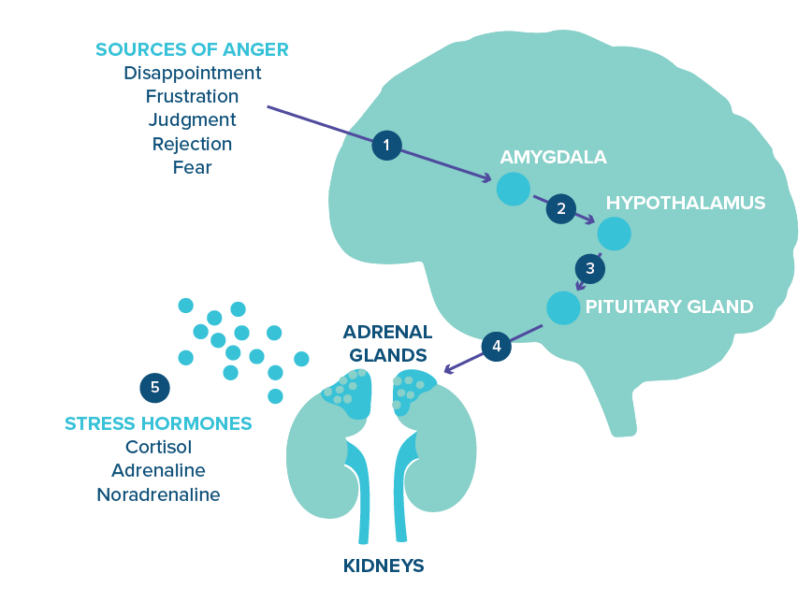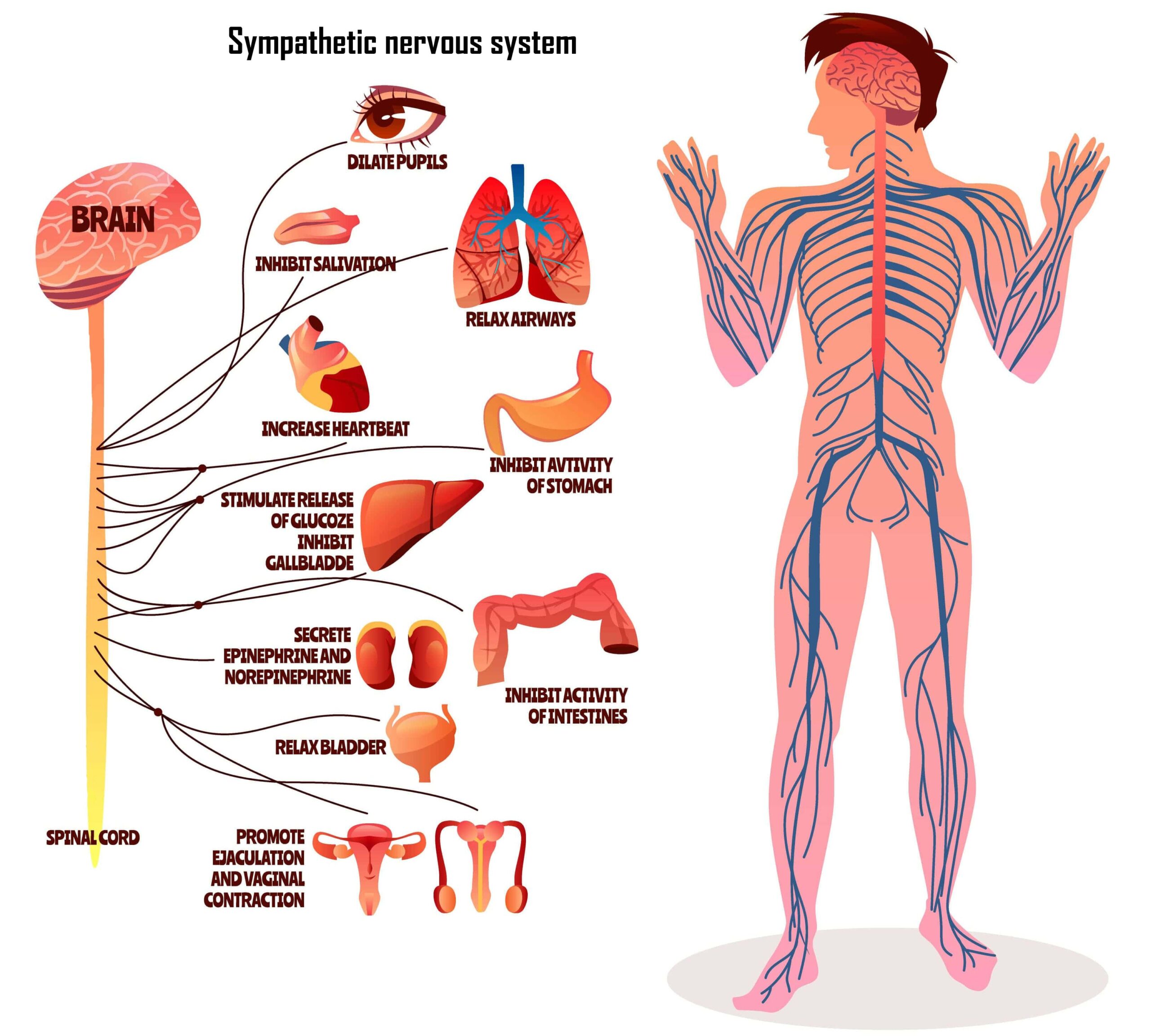
Suppressed anger is one of the major causes of anxiety that isn’t talked about. People often mistake suppressed anger symptoms with anxiety symptoms and suffer silently. Anger and anxiety are both regulated by amygdala and share similar paths of physiological response. In this article I will cover the physiology of how suppressed anger turns into anxiety and common psychological reasons why you might suppress anger.
People who suffer from anxiety encounter difficulty self-regulating anger. Thoughts and feelings of anger often get suppressed by psychological defenses and don’t reach a person’s consciousness. This process happens quite naturally and a person might not be even aware of it.
Sometimes when you ask an anxious person if he feels angry or frustrated in a particular situation, the common answer will be: ,,No” or ,,I have to think about it.”
Suppressed anger activates the sympathetic nervous system and leads a person to experience anxiety symptoms such as variable heart rate and blood pressure, cold and wet hands, sweating, paleness, stomach rotting and pain, breathing difficulties, frequent urination, etc.

Physiology of anger
Anger is regulated by the brain region known as amygdala. Amygdala regulates fight-or-flight response where fight is related to anger but flight to fear response in the body.
When you are angry the amygdala activates hypothalamus which sends further signals to pituitary glands. Pituitary glands activate adrenal glands which secrete stress hormones like cortisol, adrenaline and noradrenaline.

Source: Mental Health Academy, The Neuroscience of Anger
Basically, when you are angry, you are also stressed. Anger puts the same strain on your body as anxiety because of the release of stress hormones.
Common physical symptoms of anger:
- Racing heart
- Chest tightness
- Trouble taking a breath
- Sweaty body, hot flashes
- Muscle tightness
- Dizziness
- Body trembling
- Headache
How suppressed anger turns into anxiety
People who suppress anger or have difficulty expressing it, can often be misled by physical symptoms of anger. They often believe that they have anxiety problems.
In reality, suppressed anger and unrealised stress hormones irritate the amygdala which triggers flight response causing you to feel anxiety symptoms such as racing heart, tightness in chest, hot flashes, dizziness.
Same stress hormones that regulate the physiological response of anger also regulate and affect fear response.
Example of how anger turns into anxiety
Most people would freak out and think that they have a heart attack or panic attack and run out of the store.
People with pre-existing anxiety problems probably would develop anxiety or phobia of standing in line at grocery stores because fear of experiencing another panic attack would often result in future panic attacks and avoidance of grocery stores.
Why did anxiety appear?
Looking back, there is nothing to be fearful of while you stand in the line of the grocery store. No one is attacking you. You were safe but why did anxiety symptoms suddenly appear? Here is the trick.
In this situation you probably felt impatient and frustration of the situation made you angry. This anger triggered release of stress hormones and energy. When energy of anger isn’t acted out, either through communication or physical activity, suppression of anger causes activation of flight (anxiety) response through the same neural pathway of amygdala –> adrenal glands.
Common reasons why you might suppress anger
There are several different mechanisms and reasons why you might suppress anger or have difficulty expressing it. In the next few paragraphs you will find common reasons people encounter when they try to overcome their difficulty of suppression of anger.
1. Projection
Projection is the most powerful defense mechanism your mind uses to suppress anger. Projection leads you to believe that other people will react in a hostile, aggressive manner if you try to express your anger, dissatisfaction with them. For example, you may feel angry with your father but at the same time fear that he may physically attack you, hurt you if you try to express your dissatisfaction.
Projection makes you fear your own aggression. You may see images, have fantasies where casual conversation turns into a fight. You may feel helpless, anxious, defenseless if conflict turns into physical altercation. Projection tricks your brain and makes you believe that expressing anger is unsafe, will get you in danger.
When projection dominates a person it makes them feel incapable of violence, defense of themselves. This insecurity creates powerful defense which leads to further avoidance of expressing anger (“getting into the conflict”). Projection can also manifest suppressed anger through dreams while you are sleeping. You may see nightmares where someone is trying to kill you or you are running away from someone who’s after you.
2. Highly sensitive nervous system
People with a highly sensitive nervous system experience the world and emotions with higher intensity. They often thrive for peace and harmony in relationships. Conflicts and disagreements in relationships affect them deeply, so unconsciously a highly sensitive person tries to avoid them. Repression of anger is used as a defense to avoid anxiety, discomfort that disagreements cause.
This discomfort also leads highly sensitive people to be a problem solver in relationships. Problem solving is used as a tool that helps to combat anxiety, discomfort that disagreements, chaos in the relationships cause. When problems are solved, a highly sensitive person regains his peace and stability within himself once again.
Degree of nervous system sensitivity can also predict anger suppression. Higher sensitivity is often related to higher suppression of anger. When a highly sensitive person has to express anger it often causes them to experience unpleasant anxiety symptoms. They may feel high intensity restlessness, worry, heart pounding, sweating, trouble taking a breath, even panic during an argument. These symptoms often lead highly sensitive people to avoid conflicting situations because anxiety symptoms are unbearable.
3. You feel guilty of being a bad person
People who suppress anger often have preconceptions of what a good person is. More than often they believe that a good person is someone who isn’t confrontational and doesn’t express his dissatisfaction, anger with others. People who suppress anger believe that expressing anger will cause damage or hurt others. They feel guilty of acting too harsh or being a bad person.
Expressing anger causes conflicting feelings. Person who suppresses anger often struggles with holding a “perfect” self-image. On one hand, he wants to behave in a way that represents his best interests but on the other hand he fears judgement, consequences that will follow. Maybe others will look at him in a different way or label him as a bad person. These fears cause overthinking and rumination which often inhibits a person from taking action.
4. You fear getting rejected, abandoned
People who suppress anger believe that expressing anger will lead to rejection, abandonment in relationships. For example, if you are angry with your boss at your job, you may feel that expressing anger might cause future problems in relationships. You may have fantasies, thoughts that your boss might become cold towards you. He might ignore you or be less attentive responding to your requests. He might say ,,No” more often, or disqualify you from future raise in salary, position.
By avoiding expressing anger you might feel that you also avoid negative consequences such as rejection, silence, mistreatment, abandonment, loneliness in the future.
5. You lack secure attachment in relationships
People who suppress anger often lack secure attachment in relationships. Secure attachment is formed during early childhood and is characterized by a person’s ability to trust, feel safe and supported in interpersonal relationships. People who suppress anger often don’t feel safe because they come from family environments where there wasn’t enough love, safety, openness and support for expression of emotions.
A lot of times these individuals have underdeveloped abilities of processing and expressing anger because these important skills were neglected. When these people are put in social situations where they have to express anger they often feel shy and insecure of expressing themselves in an assertive manner.
